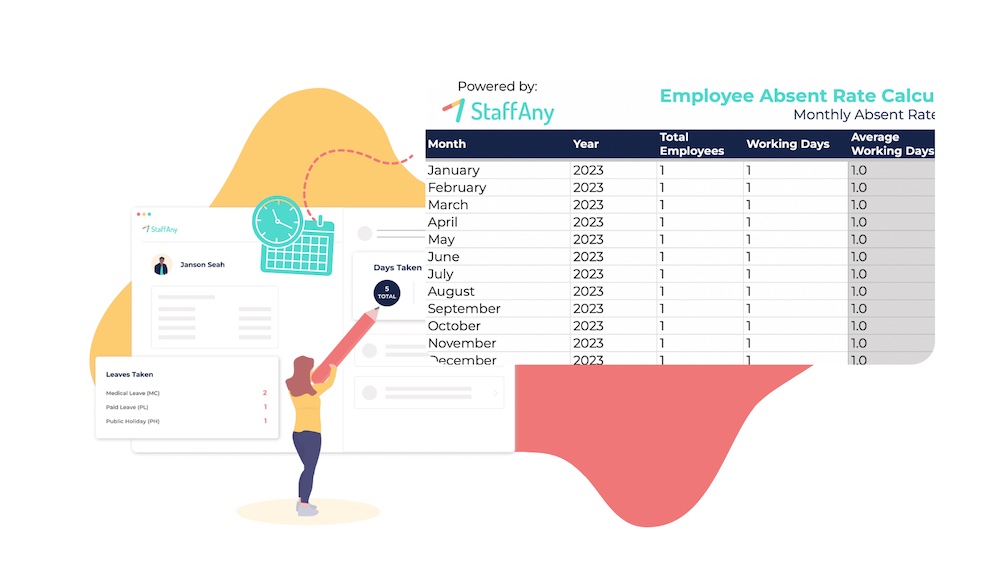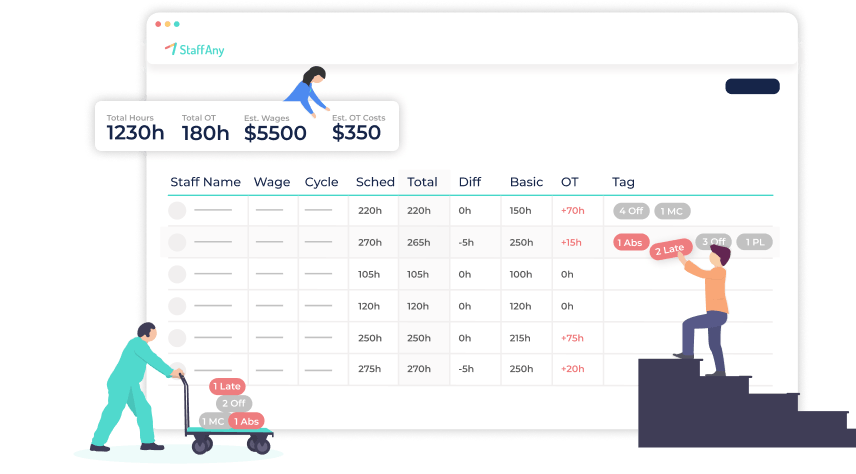The Free Template for Employee Absence Rate Calculator by StaffAny
Employee Absence Rate Calculator is an easy-to-use and simple template with predefined formulas to calculate your organization’s monthly and annual absenteeism percentage.

How Can Our Template Help You?
1. There is no need to dedicate time to calculate absences manually.
2. This template helps you design absence management policies that reduce unplanned absences, improve organisational productivity, minimise absence costs, and support the overall well-being of your employees.
Do you find it useful? Share it with others and let them know how you calculate your absent rate.
Did you know?
StaffAny has helped companies across multiple countries in several other ways.

Cost Optimization
Up to $24K annual labor cost savings

Time Savings
50% faster timesheet consolidation

Punctuality
For Owner/ HRs Who Want Better Cost Control


Time Tracking Made Easy
Modern Time and Attendance software with features that empowers you with real-time visibility and decision-making abilities, resulting in efficiency, cost savings and faster timesheet consolidation, as much as 50% faster.
More Punctuality, Increasing Efficiency and Better Control

StaffAny Absence Rate Calculator
The absence rate calculator is a valuable tool designed to assist businesses in measuring and evaluating employee absenteeism within their workforce. This tool provides businesses with a simple and efficient way to calculate and analyze the rate of employee absences over a specific period.
By leveraging the absence rate calculator, businesses can accurately assess the frequency and duration of employee absence rate, allowing them to gain valuable insights into the overall impact of absenteeism on their operations. This tool aids businesses in identifying any patterns or trends related to employee absences, enabling them to make informed decisions and implement strategies to address any underlying issues.
The absence rate calculator also serves as a powerful resource for businesses to monitor the effectiveness of their absence management policies and procedures. By regularly using this tool, businesses can track changes in employee absenteeism rate over time and assess the success of any implemented absence management initiatives.
Furthermore, the employees absence rate calculator facilitates the identification of any potential productivity gaps caused by employee absenteeism. By helping to calculate the absence rate, businesses can manage and mitigate any disruptions to their operations proactively. In essence, the absence rate calculator is an essential tool for businesses seeking to improve their workforce management strategies and enhance overall operational efficiency.
Frequently Asked Questions
The employee absenteeism rate is a measure used to calculate the frequency with which an employee is absent from work. Employee absences can occur for various reasons, including illness, medical appointments, paid time off (PTO), vacation, holidays, or family matters. However, when employees habitually miss work without prior notice, approval, or official leave, this constitutes absenteeism.
Absenteeism refers to the persistent absence of an employee from work, whether it involves taking a full day’s leave or engaging in time-related misconduct, such as arriving late, leaving early, or taking extended breaks. In simpler terms, it signifies an employee’s deliberate and ongoing absence from work.
Monitoring the absence percentage is crucial because it can help organizations identify and address workplace issues. While companies can anticipate and plan for legitimate absences, managing chronic absenteeism presents greater challenges. By assessing the absence rate, employers can investigate whether absenteeism is contributing to excessive employee absenteeism or reduced productivity. This analysis allows for informed decisions and support for long-term improvement.
To address employee absenteeism effectively, it’s essential to use the provided statistics as a benchmark to compare absence patterns and behaviours among employees. However, true prevention requires a commitment to cultivating a positive work culture. Promoting a culture of well-being, where employees feel engaged and motivated in their roles, can significantly contribute to reducing absenteeism and fostering a healthier work environment.
A low absenteeism rate is a positive indicator, signifying that employees are content with their work environment. Conversely, a high absenteeism rate can be costly for both employees and employers. Employees with a persistent absenteeism habits jeopardize not only their professional reputation but also their job security.
Yes, this template is entirely free to use, and you can replicate it as needed to meet your company’s specific requirements.
For more information or assistance in calculating the employees absence rate, absence percentage, or addressing issues related to absenteeism, please feel free to contact us.






